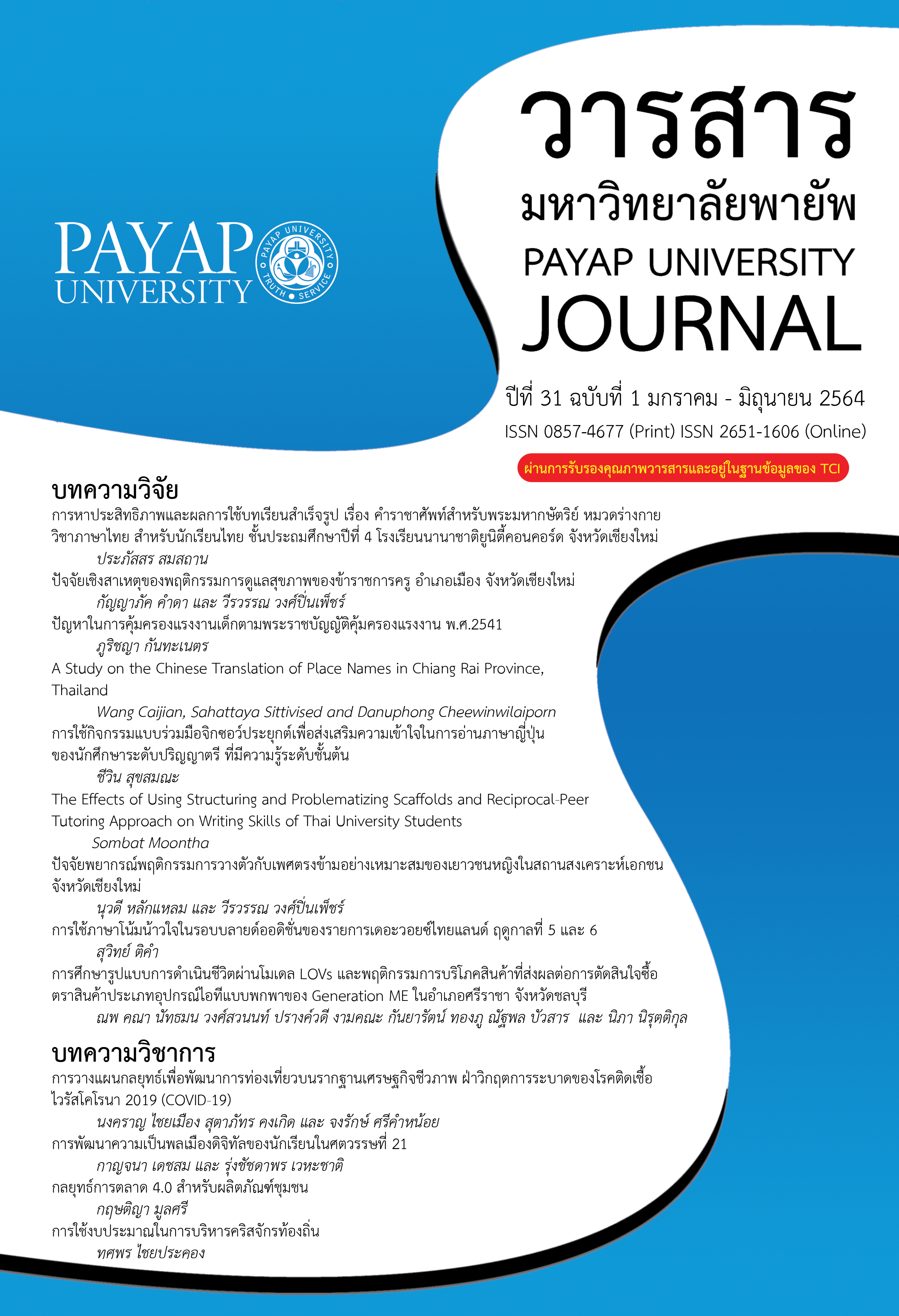การพัฒนาความเป็นพลเมืองดิจิทัลของนักเรียนในศตวรรษที่ 21
Main Article Content
บทคัดย่อ
บทความวิชาการฉบับนี้ เขียนขึ้นโดยมีวัตถุประสงค์เพื่อนำเสนอแนวความคิดเกี่ยวกับความเป็นพลเมืองดิจิทัล และแนวทางการพัฒนาความเป็นพลเมืองดิจิทัลของนักเรียนในศตวรรษที่ 21 ความเป็นพลเมืองดิจิทัล (Digital Citizenship) เป็นทักษะสำคัญแห่งการเรียนรู้ในศตวรรษที่ 21 ความเป็นพลเมืองดิจิทัล สามารถแบ่งเป็น 3 คุณลักษณะใหญ่ ดังนี้ 1) มีมารยาทในการใช้งานดิจิทัล 2) มีความรับผิดชอบในการใช้ดิจิทัล และ3) สร้างนวัตกรรมดิจิทัล การพัฒนาความเป็นพลเมืองดิจิทัลของนักเรียนในศตวรรษที่ 21 มีแนวทาง ดังนี้ 1) พัฒนาหลักสูตรพลเมืองดิจิทัล จัดทำหลักสูตรและจัดการเรียนการสอนบูรณาการเข้าไปในการเรียนรู้ของสาระวิชาต่างๆ จัดกิจกรรมเสริมหลักสูตร เพื่อให้นักเรียนมีความรู้ความเข้าใจที่ดียิ่งขึ้น และมีการนำไปใช้ในชีวิตจริง 2) พัฒนาผู้บริหารและครู ให้มีความรู้ ทักษะ ความสามารถเชิงบูรณาการมีความรู้ความสามารถเชิงลึกในการแก้ปัญหา สร้างครูต้นแบบในการพัฒนาวิชาชีพครู สร้างชุมชนการเรียนรู้ระหว่างครูที่ปฏิบัติในวิชาชีพเดียวกัน 3) พัฒนาด้านทรัพยากรและแหล่งเรียนรู้ สนับสนุนและพัฒนารูปแบบการเรียนรู้ที่เหมาะสมแก่ผู้เรียนด้วยกระบวนการดิจิทัล โดยเชื่อมโยงความรู้หรือแลกเปลี่ยนความรู้กับชุมชน สร้างโอกาสให้ผู้เรียนได้เข้าถึงสื่อเทคโนโลยี มีเครื่องมือและแหล่งเรียนรู้ที่มีคุณภาพ
Article Details
เอกสารอ้างอิง
กระทรวงศึกษาธิการ. (2560). มาตรฐานการเรียนรู้และตัวชี้วัดกลุ่มสาระการเรียนรู้คณิตศาสตร์ วิทยาศาสตร์ และสาระภูมิศาสตร์ในกลุ่มสาระการเรียนรู้สังคมศึกษา ศาสนา และวัฒนธรรม (ฉบับปรับปรุง พ.ศ. 2560) หลักสูตรแกนกลางการศึกษาขั้นพื้นฐานพุทธศักราช 2551. กรุงเทพฯ: โรงพิมพ์ชุมนุมสหกรณ์การเกษตรแห่งประเทศไทยจำกัด.
ชวลิต โพธิ์นคร. (2560). ห้องสมุดดิจิทัลกับการก้าวสู่ยุคThailand 4.0, สืบค้นเมื่อ 30 พฤศจิกายน 2563. http://km.li.mahidol.ac.th/thai-studies-in-thailand-4-0/
นิคม ชัยขุนพล. (2560). ลักษณะปฏิสัมพันธ์การสื่อสารจากพฤติกรรมการใช้สื่อสังคมเครือข่ายออนไลน์ของคนไทย. วารสารมหาวิทยาลัยพายัพ, 27 (2), 55-65.
มูลนิธิสถาบันวิจัยเพื่อการพัฒนาประเทศไทย. (2556). การจัดทำยุทธศาสตร์การปฏิรูปการศึกษาขั้นพื้นฐานให้เกิดความรับผิดชอบ, สืบค้นเมื่อ 12 มีนาคม 2564. http://tdri.or.th/wp-content/uploads/2014/03/Final-Paper.pdf
วรพจน์ วงศ์กิจรุ่งเรือง. (2561). คู่มือพลเมืองดิจิทัล. กรุงเทพฯ: สำนักงานส่งเสริมเศรษฐกิจดิจิทัลกระทรวงดิจิทัลเพื่อเศรษฐกิจและสังคม.
เศกสรร สกนธวัฒน์. (2560). กลยุทธ์การบริหารโรงเรียนในเครือมูลนิธิคณะเซนต์คาเบรียลแห่งประเทศไทยตามแนวคิดการเสริมสร้างนักเรียนให้มีความเป็นพลเมืองดิจิทัล. วิทยานิพนธ์ดุษฎีบัณฑิต คณะครุศาสตร์ จุฬาลงกรณ์มหาวิทยาลัย.
สรานนท์ อินทนนท์. (2563). ความฉลาดทางดิจิทัล (DQ: Digital Intelligence). กรุงเทพฯ: มูลนิธิส่งเสริมสื่อเด็กและเยาวชน. http://cclickthailand.com/wp-content/uploads/ 2020/04/dq_FINAL.pdf
สำนักงานเลขาธิการสภาการศึกษา. (2555). การพัฒนาคุณลักษณะผู้เรียนยุคใหม่เพื่อรองรับการปฏิรูปในทศวรรษที่สอง ด้วยการบูรณาการ ICT ในการจัดการเรียนรู้ด้วยโครงการ. กรุงเทพฯ: บริษัท พริกหวานกราฟฟิค จำกัด.
สำนักงานสถิติแห่งชาติ. (2562). การใช้ไอซีทีของเด็กและเยาวชน พ.ศ. 2561 (ไตรมาส 4). กรุงเทพฯ: ผู้แต่ง.
สุจิตรา แก้วสีนวล, อุดมลักขณ์ ธรรมปัญญา และ ลัดดา จิตตคุตตานนท์. (2563). อุดมการณ์ความเป็น “เด็ก” ที่สะท้อนผ่านการเรียนการสอนการรู้เท่าทันสื่อดิจิทัล. วารสารมหาวิทยาลัยพายัพ, 30(2), 31-47.
Ministry of Education Singapore. (2014). Student Development Curriculum Division. Syllabus Cyber Wellness Secondary. Singapore: Ministry of Education.
Netsafe New Zealand. (2015). Digital Citizenship on New Zealand School. New Zealand: Overview.
Partnership for 21st Century Skill. (2014). Framework for 21st Century Learning, Retrieved December 10, 2020. https://www.teacherrambo.com/file.php/1/21st_century_skills.pdf
Polizzi, G. (2020). Digital literacy and the national curriculum for England: Learning from how the experts engage with and evaluate online content, Retrieved March 15, 2021. https://www.sciencedirect.com/science/article/pii/S0360131520300592
Ribble, M. (2019). Digital Citizenship. Retrieved December 10, 2020, http://www.digitalcitizenship.net /nine-elements.html.
Suppo, C. A. (2013). Digital Citizenship Instruction in Pennsylvania Public School: School Leaders experienced beliefs and current practices. Doctoral’s thesis. Doctor of Education, Pennsylvania University.
UNESCO. (2015). Fostering Digital Citizenship through Safe and Responsible Use of ICT. Bangkok: UNESCO.
UNESCO. (2018). A Global Framework of Reference on Digital Literacy Skills for Indicator, Retrieved December 10, 2020. http://uis.unesco.org/sites/default/files/documents /ip51-global-framework-reference-digital-literacy-skills-2018-en.pdf


